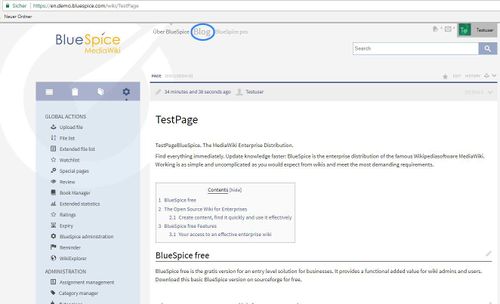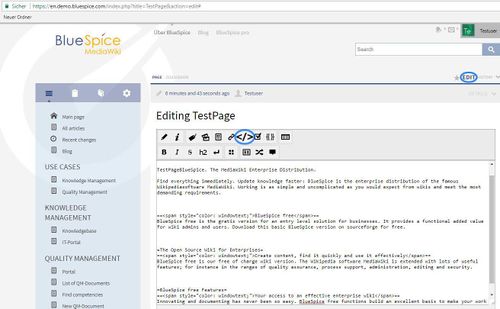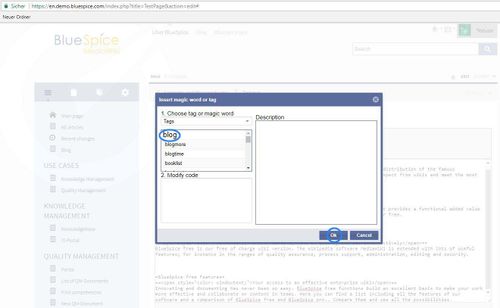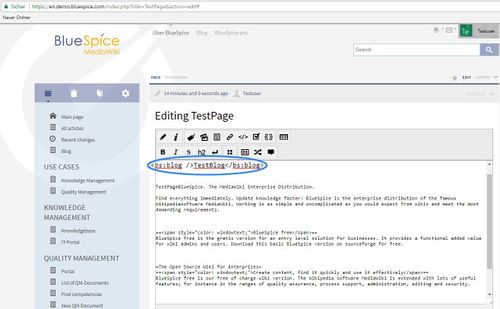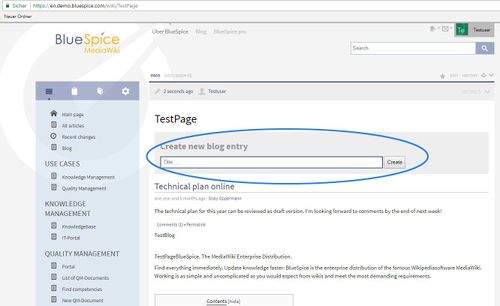Blog
-
- Last edited 7 years ago by Anja Ebersbach
-
-
- This page is a first draft
Contents
What is Blog?
Blog extension allows creating news feeds on the wiki. These news feeds can be shown on any page, and users can be allowed to add their own news.
Where can I find the blog function?
In the TopMenuBar, at the very top of any page there is a link to Blog special page, which then opens a page containing a form for writing a new blog entry and a list of previous entries.
Blog news feed can be displayed on any page by adding blog tag to the page
This will also display "Create new blog" form on the page, unless its disabled using blog tag attibutes.
A blog entry consists of a title, revision information (date and author of first revision), the entry itself and possibly links for comments and a permalink.
If a blog entry is too long, link "continue reading" will be displayed.
Write an entry or create a new entry
As described above, new blog entries can be created through the form on the page containing blog tag, on Blog special page (Special:Blog), or by directly creating new pages in Blog namespace.
Blog tags
Blog extension offers several tags. These tags can be added to a page using InsertMagic functionality, or writing tag syntax directly to wiki code editor.
| Wiki tag | Description |
|---|---|
| <bs:blog /> | Displays blog news feed on the page. It can be extended with multiple attributes. For more on attubutes read section "Blog tag attibutes" below. |
| <bs:blog:more /> | This tag should be placed inside the content of a blog entry (pages in Blog namespace) to define at which point in text "continue reading" link should be placed. This will override default cut-off length of an entry. |
| <bs:blog:time time="YYYYMMDDHHmm" /> |
This tag also should be placed inside the content of a blog entry. It allows manually defining timestamp for that particular blog entry. Timestamp is used in sorting and displaying blog entries. |
Creating a second blog
As described, default blog feed is consisted of pages in Blog namespace. Other blog feeds can exist in addition to this feed, and they can be defined by category of namespace.
For example, category "Company news" can be designated for a second blog. In that case all pages in this category will be considered entries of this blog and will be displayed on page as blog entries. In this case, when adding <bs:blog /> tag to the page, attribute "cat" must be set to "Company news", like so: <bs:blog cat="Company news" />
Other option is to designate a namespace for this purpose. Using example from above, namespace "Company news" must be created and all pages inside this namespace (Company news:News1, Company news:News2) will be considered blog entries. Syntax that should be used for blog tag in this case is: <bs:blog ns="Company news" />
Keep in mind that when blog tags with "cat" or "ns" are used, all pages from that category/namespace will be shown, so those categories/namespaces should be used for that purpose only.
<bs:blog /> attributes
The following tag arguments can be used with the tag <bs:blog />:
| Attribute | Description | Value |
|---|---|---|
| count | Number of blog entries to be displayed. | number |
| cat | Category from which to show pages as blog entries | Category name |
| ns | Namespace from which to show pages as blog entries | Namespace name or ID |
| newentryfield | Should "Create new blog entry" be shown? | 0 or 1 |
| newentryfieldposition | Position of the "Create new blog entry" form. | "bottom" or "top" |
| renderimages | Should images be displayed | 0 or 1 |
| maxchars | Number of characters that should be shown before the "Continue reading" link is shown. | number |
Default values for these attributes can be set in global BlueSpice preferences. See section "Configuration" below
Configuration
Many default parameters for this extension can be configured on Special:BlueSpicePreferences, under section "Blog".
| Setting | Description | Default value |
|---|---|---|
| Display pictures as | Defines how should images in blog entries be handled. There are three options: full (image will be shown in full size), thumb (image will be shown as a thumb) and none | thumb |
| Number of words per entry | How many words to allow in the blog post before "continue reading" is shown | 1000 |
| Open new window for read more | Should full version of the blog entry, once "continue reading" is clicked, be opened in same or new tab/window | false |
| Position for the new blog entry form | Whether to show create new form on top or bottom of the page | |
| Show all entries link | true | |
| Show information about the entry | true | |
| Number of blog entries | Number of blog entries to show per page | 10 |
| Show new blog entry form | Should "Create new blog entry" form be shown | true |
| Show permalink link | Should permanent link to blog entry be shown |
true |
| Sort by | Should blog entries be sorted by creation time or by title |
creation |
| Text flow: Image position | Position of the image in the blog entry, right, left or none |
right |
Rights (permissions)
This extension introduces new permission "blog-viewspecialpage" that allows users who have it to access Special:Blog
Requirements
Blog requires BlueSpice Foundation.
Tips for working with blogs
Put a link to the blog in the left hand navigation menu. Then your colleagues will be able to find the blog whenever they want.
